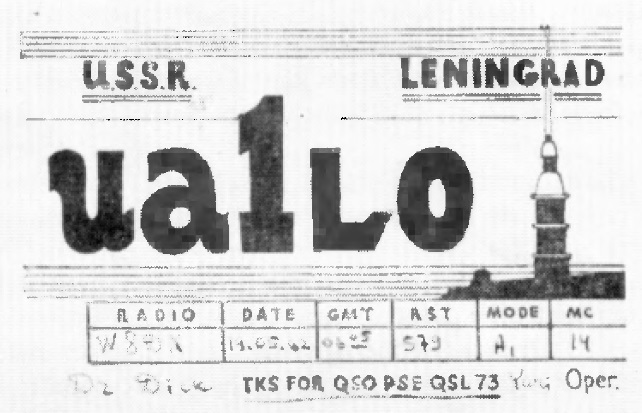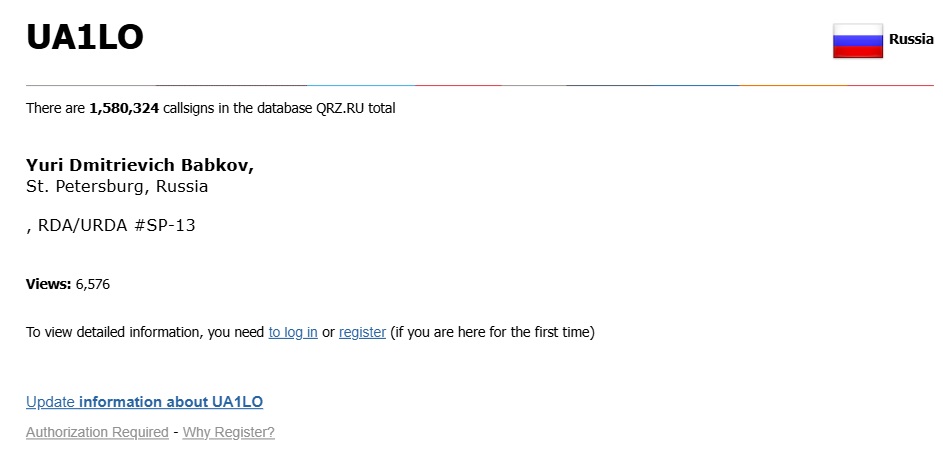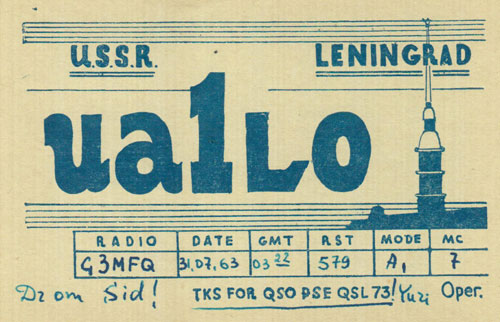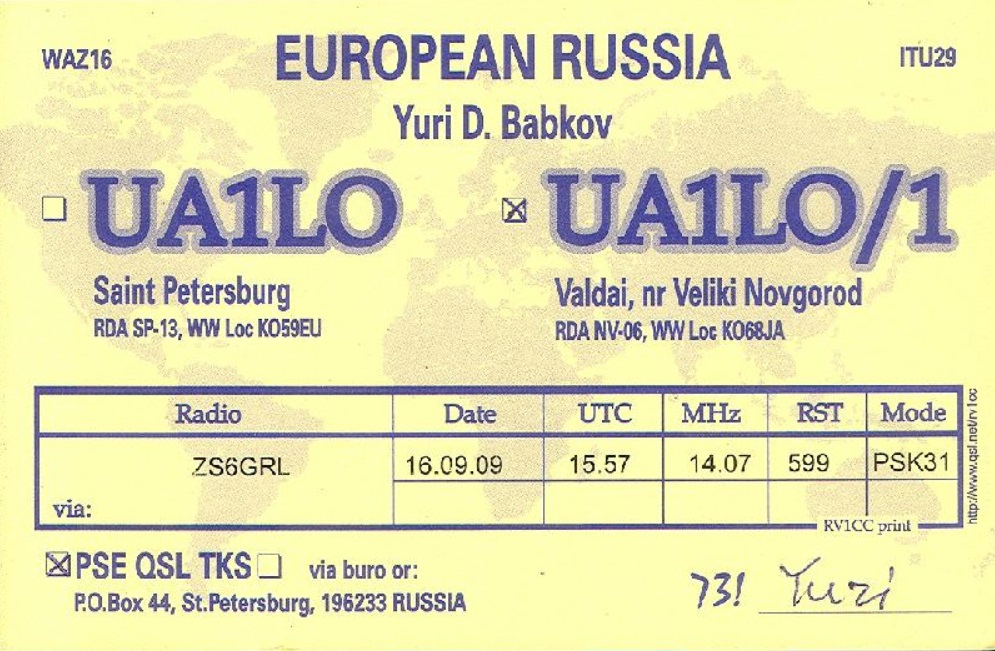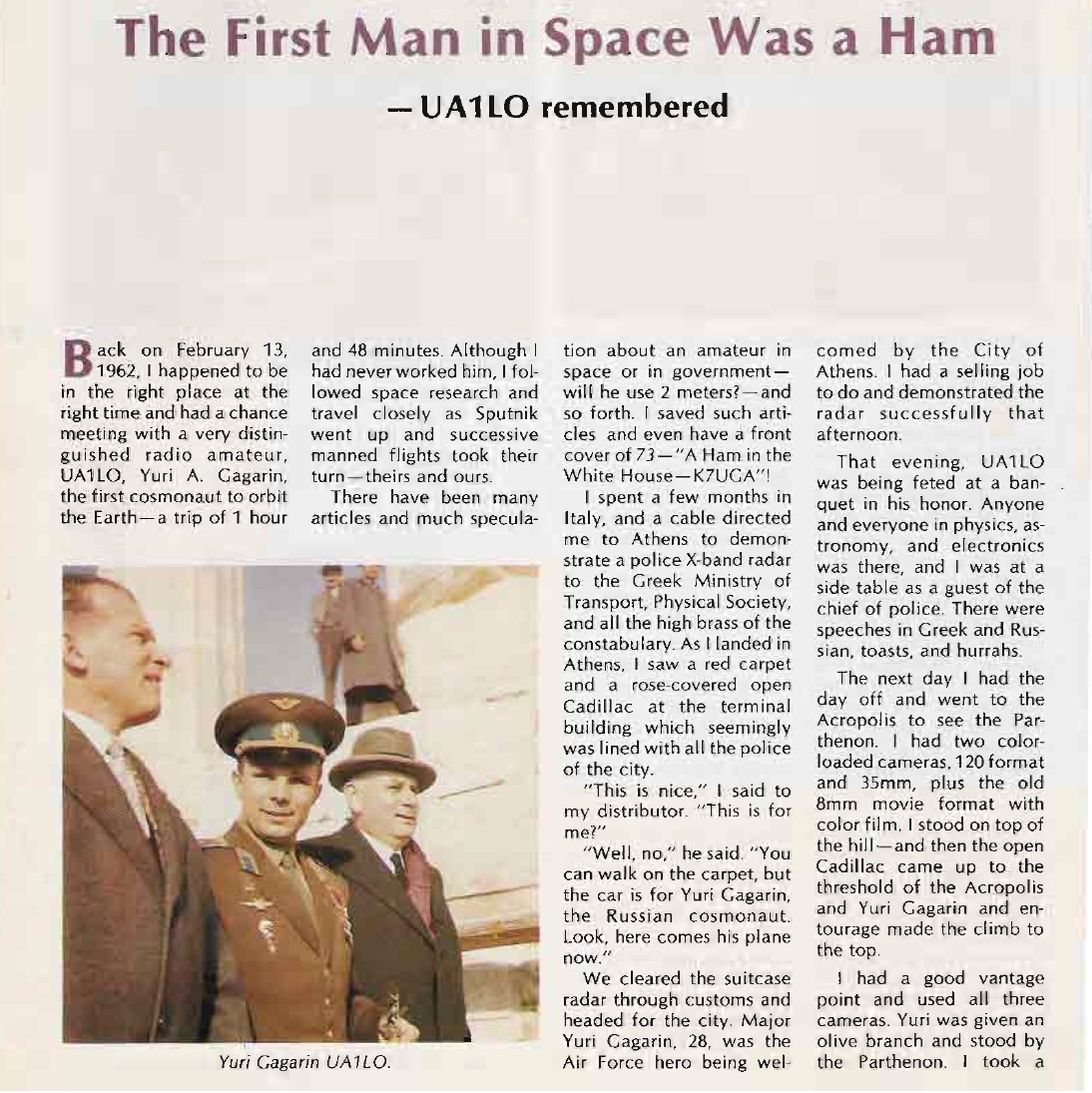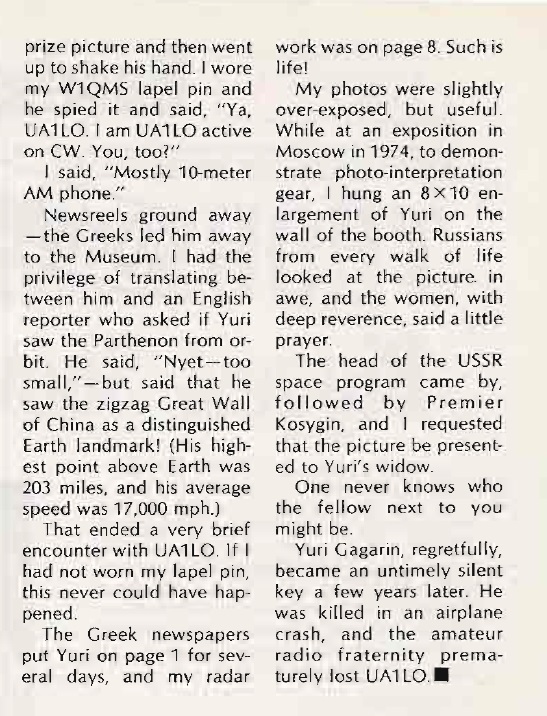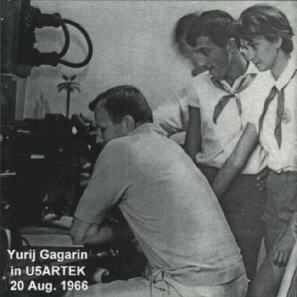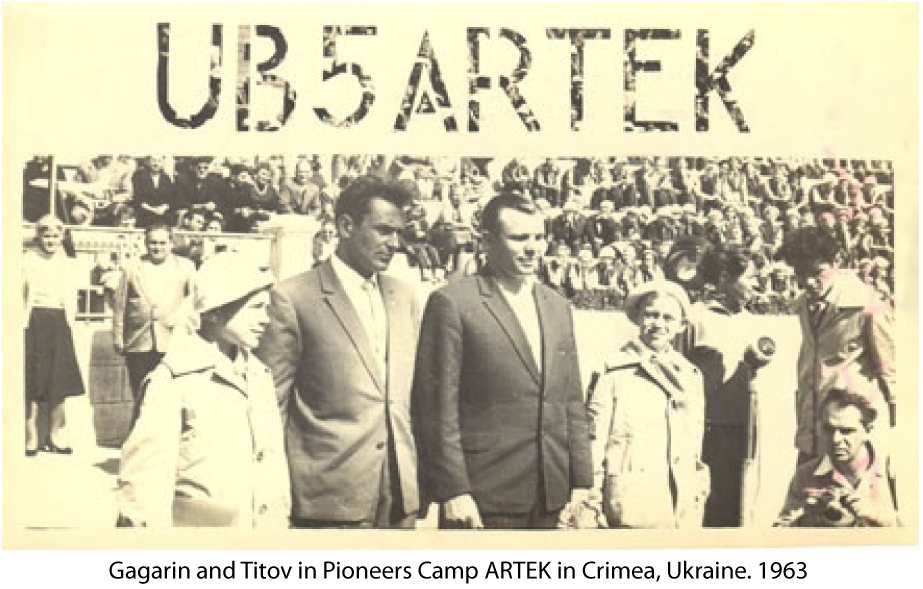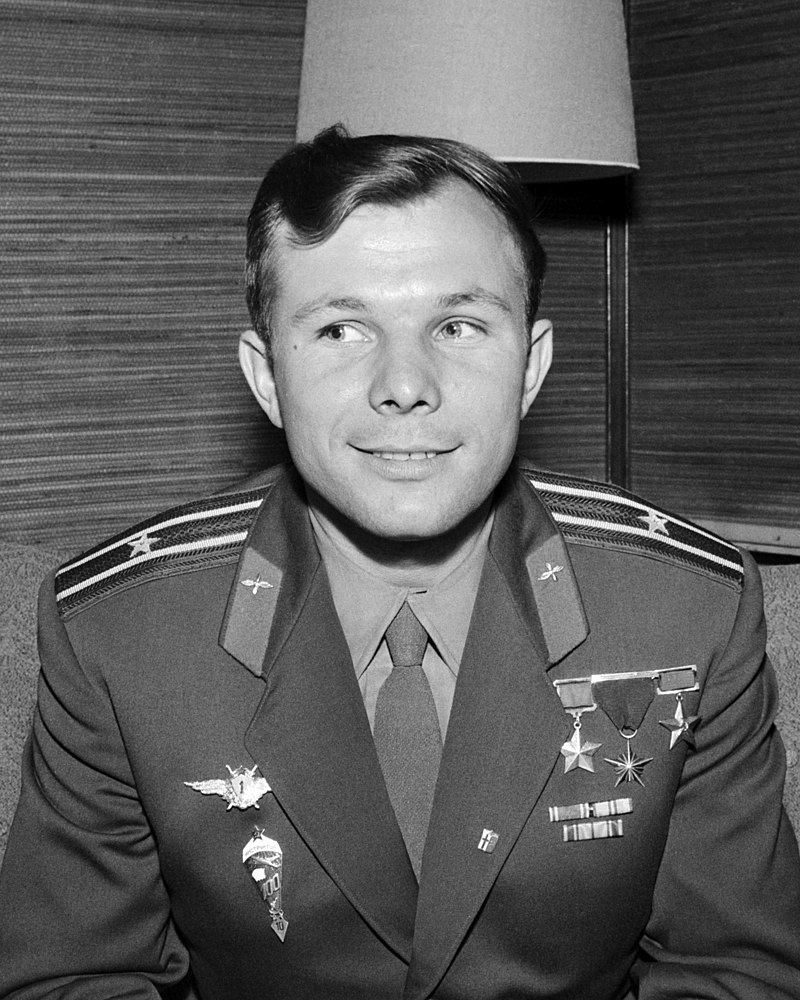 Every few years the myth that Cosmonaut Yuri Gagarin was radio amateur UA1LO crops up again. This myth started in the early 1980’s and has been debunked numerous times since but it still appears on websites listing “Famous Hams”.
Every few years the myth that Cosmonaut Yuri Gagarin was radio amateur UA1LO crops up again. This myth started in the early 1980’s and has been debunked numerous times since but it still appears on websites listing “Famous Hams”.
Martin Davidoff, K2UBC, posted this on the AMSAT Bulletin Board in 2002:
This note is in response to several related comments that appeared on the AMSAT-BB last week. Since not everyone reading this BB was radio active back in the 60’s, 70’s, 80’s, and 90’s I’ve included some background
information.
The earliest known statement suggesting that Yuri Gagarin was a Radio Amateur appeared in the March/April 1981 issue of Orbit magazine, the primary publication of AMSAT-NA at the time. It was in an article by Joe Kasser, G3ZCZ, [the editor of Orbit] titled “A History of Radio Amateurs in Space — Part 2”. The article stated that Yuri Gagarin, the first person to fly in space, was UA1LO.
The evidence provided for this assertion was a QSL card from UA1LO to W8DX confirming a QSO on May 19, 1962 signed “Yuri”. Figures in the Orbit article showed several Russian stamps, and a photo, all featuring Gagarin. Joe never stated that the stamps or the photo were from the back of the QSL card but the reader could easily make that assumption. Joe later reported that the stamps were from his collection. I believe that the photo was on the flip side of the QSL and that the card was probably via the famous Box 88, Moscow.
Needless to say, the article caught my attention. However, after reading it carefully I concluded that this was just a typical UA QSL from the early 60’s. I felt that the fact that the operator happened to be named “Yuri”, a relatively common name, and that the Gagarin photo appeared on the back of the card didn’t justify the conclusion that UA1LO was Gagarin. I have to admit that it occurred to me that, in the QST tradition, the article was an “April Fool Feature” (check the publishing date).
Several months after the Orbit article appeared I ran into Joe at an AMSAT Meeting in the MD/DC area and asked him if the article was true. Since this is more than 20 years ago and I have trouble recalling what happened last week I don’t fully trust my memory as to his response but I do remember concluding that the UA1LO – Gagarin connection was probably not valid. Joe states that based on the information he had available at the time he believed the statement to be true — the article was NOT an April Fool Feature.
Shortly after his famous flight into space (April 12, 1961) Yuri Gagarin was declared a “Hero of the Soviet Union” by the government. This is an honor of the highest order awarded to citizens making outstanding contributions to Soviet culture and life. Perhaps more important, Gagarin was truly regarded as a hero by the general population. Shortly after his flight photos of Gagarin were widely distributed all over the Soviet Union, especially to youth groups and in schools. It’s very likely that picture postcards with the famous photo were widely circulated.
At the time it was common practice for individual Soviet hams (those with their own stations) to produce QSL cards using linoleum block printing over, or on the flip side of, photo’s of famous people, places or works of art. [At the time most UA activity was from club stations].
Last week I read with great interest the AMSAT-BB note from Frank Cahoy, K0BLT, concerning his 1961 QSL from UA1LO (dated August 18, 1961) with the photo of Gagarin on the back. Frank sent me a scanned copy of the QSL and a translation (thanks to K5OE) of the text printed on the card. The card itself was somewhat different from the one W8DX received but it tends to support the contention that the cards sent to W8DX and K0BLT are generic QSL’s featuring a photo of a very popular Soviet hero from an operator who happened to be named “Yuri”.
The scan of K0BLT’s QSL appears to be a stock postcard featuring a photo of Gagarin with “UA1LO Leningrad” added using Linoleum block (or similar) printing techniques. The Cyrillic text, lower right on the address side, is characteristic of standard postcard printing.
I’d like to clearly state that there is absolutely NO reason to suspect that UA1LO had any intention of misleading anyone as to his identity. He was simply following common everyday procedures and it probably never occurred to him that his card might cause confusion.
I understand that shortly after Joe’s 1981 article appeared there was an article or editorial by Wayne Green, W2NSD, which also mentioned the “fact” that UA1LO was Yuri Gagarin. I have not seen this article so I don’t know if it contains any additional facts. I assume that it is based entirely on Joe’s comments. If anyone has information to the contrary please make it public.
For those of you not familiar with Wayne let me say that over a period of several decades he was a very well known and influential commentator on Amateur Radio. His articles, editorials and speeches were often informative and provocative; they were always interesting. However, as a journalist, Wayne made it clear that he considered fact checking a waste of time and he never let facts ruin a good story. I’m sure that he’d have a good laugh if he knew he was being quoted as an authority on a question concerning historical accuracy.
Leo Labutin, UA3CR, was a key figure in the group of Soviet Radio Amateurs that built and arranged for the launch of the early RS satellites. In about 1989 he made his first trip to the U.S. and I had the opportunityof meeting his Aeroflot flight and acting as his host for a few days before we flew to Atlanta for the AMSAT convention. During the visit I asked him if he knew whether Gagarin was a Radio Amateur — specifically if he were UA1LO. Leo replied that he knew of NO evidence that Gagarin was a Radio Amateur. [His wording was a little more colorful]. I did NOT ask Leo if he knew Gagarin or UA1LO personally so you can choose to consider his comments to be hearsay evidence.
During the mid 1970’s and early 1980’s I had the opportunity to see numerous copies of RADIO, the primary hobby magazine covering electronics and Amateur Radio in the Soviet Union. One of the goals of the magazine was to encourage young people to develop an interest in technical areas by presenting interesting projects and by describing achievements of prominent Russians involved in exciting technical programs. I believe that if Gagarin was UA1LO the fact would have been mentioned often in RADIO. I NEVER saw any mention of Yuri Gagarin being a Radio Amateur in the magazine. Since the sample of issues I saw was limited you are free to conclude that the information in this paragraph is irrelevant.
Over the years the statement that Gagarin was UA1LO continues to resurface. To the best of my knowledge no significant new evidence has appeared during this time.
So — Was Gagarin UA1LO?
My opinion (and it is only my opinion) is that based on the available evidence it’s extremely unlikely that Gagarin was UA1LO. But I am not 100% certain and I am always looking for new “facts”.
In the 22 years since that was posted no-one has been able to provide any solid evidence that Yuri Gagarin was a radio amateur.
The evidence seems conclusive that UA1LO was an amateur radio operator called Yuri Babkov, first licenced with the callsign UA1LO sometime before 1961 and still licenced in 2009, Gagarin died 1968.
There is, however, one aspect that is intriging, it concerns the 73 magazine article mentioned by Martin Davidoff. It appeared in the October 1980 issue of 73, a special space and satellite issue, published several months before the mistaken article in Orbit magazine.
It was written by a Werner “Mac” Maurer W1QMS and tells about his trip to Greece on February 12, 1962, to try to sell X-band radars to the police. He describes how he had a brief encounter with Yuri Gagarin on February 13 at the Parthenon. W1QMS claims Yuri told him he held the callsign UA1LO and was a CW operator.
This appears to directly contradict the solid QSL card evidence that UA1LO was held by Yuri Babkob, so why did W1QMS write it? It is not implausable he had heard about the QSL cards W8DX and others received and this in turn caused him to completely misremember a conversation with Gagarin when he was writing a story for Wayne Green W2NSD’s special space issue of 73 magazine. It will certainly have helped his article get published.
Athens News report on Yuri Gagarin’s visit https://en.rua.gr/2023/04/12/yuri-gagarin-visited-athens-at-a-hot-time-for-greece-and-the-ussr/
73 magazine https://ia601607.us.archive.org/27/items/73-magazine-1980-10/10_October_1980.pdf
There is one tiny link between amateur radio and cosmonaut Yuri Gagarin. shortly after his mission he, along with cosmonaut Titov, visited the Soviet Young Pioneer Camp ARTEK located at Gurzuf, Crimea, Ukraine SSR and his image was used on the QSL card of the camp’s amateur radio station’s, callsign UB5ARTEK, later changed to U5ARTEK. He visited again on August 20, 1966, and was shown the club station. He was allowed to use the microphone and gave the callsign as U5ARTEK/KEDR (KEDR had been his callsign during his space mission). Source UT7UT http://ut7ut.com/index.php/u5artek/

